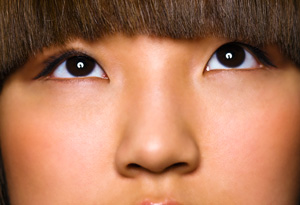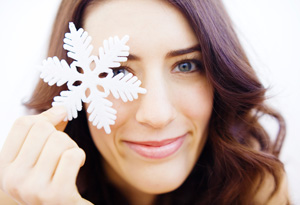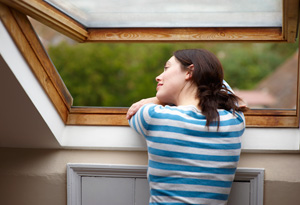How Self-Acceptance Can Crack Open Your Life
A Radical 10-Day Plan to Accept Who You Really Are

Photo: Christoph Martin/Getty
Self-acceptance is an invitation to stop trying to change yourself into the person you wish to be, long enough to find out who you really are. Robert Holden has a 10-day plan to help you figure out who this self is that you're supposed to be accepting and how to say yes to your life.
Do you accept yourself as you are? It's a simple question that many people find difficult to answer. At the deepest level, self-acceptance is either complete or not at all, but for most, yes/no feels too limited because you worry about all the things you would like to change about yourself. Take a moment right now to assess where you are on the self-acceptance scale. Over the next 10 days, focus on just one main principle and exercise on the pages that follow. At the end, take the test again to see how much you've grown.
Take the self-acceptance test now!
Next: Start the 10-day plan to self-acceptance

Photo: Tom Merton/Getty
Client story: "Self-acceptance doesn't work for me," said Mary, sounding weary. "I just can't do it." "Why not?" I asked. "Because," she said, pointing at herself, "I don't know who this 'self' is that I'm meant to be accepting."
Lesson: The journey of self-acceptance starts when you acknowledge that you don't seem to know much about yourself. Your personality, or ego, finds it difficult to answer questions like "Who am I?" and "What do I want?" Being asked to describe yourself at a job interview or for a dating agency profile, for instance, can feel excruciating and practically impossible because you haven't really been paying attention.
True self-acceptance is motivated by the possibility of knowing what your true essence—the Unconditioned Self—is really like.
Exercise: Self-acceptance is the process of befriending the Unconditioned Self—the part of you that is more than just your name, your history, your story, your failures or your successes. You are more than just your experiences or how other people see you or the clothes you wear.
Reflect on this today: What is most authentic about you? What do you want people to really know about you? Who are you without your ego? Be still, and really listen to how you answer. Then, write down in your journal the qualities that describe your real, unconditioned self. If you're having a little trouble answering these questions for yourself, try writing a biography of your real self in 100 words.
Next: How to practice self-kindness
Lesson: The journey of self-acceptance starts when you acknowledge that you don't seem to know much about yourself. Your personality, or ego, finds it difficult to answer questions like "Who am I?" and "What do I want?" Being asked to describe yourself at a job interview or for a dating agency profile, for instance, can feel excruciating and practically impossible because you haven't really been paying attention.
True self-acceptance is motivated by the possibility of knowing what your true essence—the Unconditioned Self—is really like.
Exercise: Self-acceptance is the process of befriending the Unconditioned Self—the part of you that is more than just your name, your history, your story, your failures or your successes. You are more than just your experiences or how other people see you or the clothes you wear.
Reflect on this today: What is most authentic about you? What do you want people to really know about you? Who are you without your ego? Be still, and really listen to how you answer. Then, write down in your journal the qualities that describe your real, unconditioned self. If you're having a little trouble answering these questions for yourself, try writing a biography of your real self in 100 words.
Next: How to practice self-kindness

Photo: Ralf Nau/Getty
Client story: "I can't accept myself as I am," said Lilly, a 38-year-old film producer. "I don't think I'm good enough yet." "When will you be good enough?" I asked. "I'm not sure," said Lilly. "If you were willing to accept yourself, you might start feeling good enough now," I said.
Lesson: Self-acceptance teaches you that you are not who you think you are. You are able to discern between your ego and your Unconditioned Self. Early on, children start to construct a persona to help cope with the demands of being in a family, going to school and facing the world. On close inspection, you find that your persona or ego is made up of judgments about who you are, what is possible, what you deserve and what you don't. These judgments become the lens through which you see yourself and the world.
For example, Lilly had created a persona commonly described as perfectionistic. This personality type focuses on getting things right and being good. It conceives an ideal self (rather than a real self) that has high standards and stringent rules you must try to live up to. Your persona judges your efforts, and the more you judge yourself, the more you move out of alignment with the innate goodness of your Unconditioned Self.
Exercise: The more you judge yourself, the less you see who you really are. The habit of self-judgment causes self-denigration in which you belittle yourself, criticize yourself, punish yourself and treat yourself without kindness. The most powerful way to undo the effects of self-denigration is kindness and forgiveness, which restore awareness of your innate goodness.
Declare today, "I forgive myself for my judgments." Affirm yourself by saying, "I will not criticize myself today." Trust in your goodness. Resolve to treat yourself with kindness.
Next: How to love yourself as you are
Lesson: Self-acceptance teaches you that you are not who you think you are. You are able to discern between your ego and your Unconditioned Self. Early on, children start to construct a persona to help cope with the demands of being in a family, going to school and facing the world. On close inspection, you find that your persona or ego is made up of judgments about who you are, what is possible, what you deserve and what you don't. These judgments become the lens through which you see yourself and the world.
For example, Lilly had created a persona commonly described as perfectionistic. This personality type focuses on getting things right and being good. It conceives an ideal self (rather than a real self) that has high standards and stringent rules you must try to live up to. Your persona judges your efforts, and the more you judge yourself, the more you move out of alignment with the innate goodness of your Unconditioned Self.
Exercise: The more you judge yourself, the less you see who you really are. The habit of self-judgment causes self-denigration in which you belittle yourself, criticize yourself, punish yourself and treat yourself without kindness. The most powerful way to undo the effects of self-denigration is kindness and forgiveness, which restore awareness of your innate goodness.
Declare today, "I forgive myself for my judgments." Affirm yourself by saying, "I will not criticize myself today." Trust in your goodness. Resolve to treat yourself with kindness.
Next: How to love yourself as you are

Photo: Dougal Waters/Getty
Client story: "I'm 10 pounds over my ideal weight," explained Mary. "The way I see it, that's not a reason to stop loving yourself," I said. "It's a reason to start loving yourself more."
Lesson: In any given moment, you are either accepting yourself or rejecting yourself. Self-rejection is identifying with your ego more than with your essence. In practice, this means you often say no to yourself. No to your real desires, no to having any needs, no to stopping and relaxing, no to making time for yourself, no to letting yourself be helped and no to loving yourself more.
As long as you continue to reject yourself, you will live in constant fear of being rejected by others. Out of necessity, you will fashion a persona that tries to be good, not to ask for anything, not to be a burden, to please people and to ingratiate itself wherever possible. This personality type will feel unlovable, no matter how hard you try to love others. The self-rejection causes you to be mean to yourself—no attention, no care, no appreciation and no self-love.
Exercise: Self-acceptance is love, and your capacity to love yourself determines your capacity to love everyone else. The less you accept yourself, the more you will criticize your friends.
Try this affirmation today: "I see myself through the eyes of love." If you are like most people, you know exactly what you don't love about yourself, but you're vague and uncertain about the ways that you do love yourself. For example, you could easily write a list of the things you don't like about your body, including the cellulite on your thighs, the size of your feet or the number on the scale, but could you write a list of all the ways you do love yourself? When you see yourself through the eyes of love, everyone in your life will benefit. If your mother had taken better care of herself, would your childhood have been any better? While you can't go back into your past, you can begin to nurture yourself now.
Write down 10 ways you are not currently being very loving to yourself. Then, go back through your list, take a look at each point and imagine what would happen if you loved every single one of your supposed flaws. Write down exactly how would your life be better and how it would change the lives of the people around you.
Next: When to move beyond self-improvement
Lesson: In any given moment, you are either accepting yourself or rejecting yourself. Self-rejection is identifying with your ego more than with your essence. In practice, this means you often say no to yourself. No to your real desires, no to having any needs, no to stopping and relaxing, no to making time for yourself, no to letting yourself be helped and no to loving yourself more.
As long as you continue to reject yourself, you will live in constant fear of being rejected by others. Out of necessity, you will fashion a persona that tries to be good, not to ask for anything, not to be a burden, to please people and to ingratiate itself wherever possible. This personality type will feel unlovable, no matter how hard you try to love others. The self-rejection causes you to be mean to yourself—no attention, no care, no appreciation and no self-love.
Exercise: Self-acceptance is love, and your capacity to love yourself determines your capacity to love everyone else. The less you accept yourself, the more you will criticize your friends.
Try this affirmation today: "I see myself through the eyes of love." If you are like most people, you know exactly what you don't love about yourself, but you're vague and uncertain about the ways that you do love yourself. For example, you could easily write a list of the things you don't like about your body, including the cellulite on your thighs, the size of your feet or the number on the scale, but could you write a list of all the ways you do love yourself? When you see yourself through the eyes of love, everyone in your life will benefit. If your mother had taken better care of herself, would your childhood have been any better? While you can't go back into your past, you can begin to nurture yourself now.
Write down 10 ways you are not currently being very loving to yourself. Then, go back through your list, take a look at each point and imagine what would happen if you loved every single one of your supposed flaws. Write down exactly how would your life be better and how it would change the lives of the people around you.
Next: When to move beyond self-improvement

Photo: David Oxberry/Getty
Client story: "I'm doing a lot of work on myself," said Sandra. "Do you ever tire of working so hard on yourself?" I asked. "Maybe all this hard work is holding you back. Why not give up working so hard at self-improvement and see what a little self-acceptance does for you. Give yourself a break."
Lesson: It is essential you understand the difference between self-acceptance and self-improvement if you are to discover your real value. Self-acceptance starts with the awareness that you are whole, innately good; lovable just as you are; and endowed with god-given talents and qualities to share with the world. Victor Frankl, author of Man's Search for Meaning, said, "My definition of success is total self-acceptance."
Self-improvement usually starts with the belief that something is lacking in you. Thus, your ego sets about working on itself, proving itself and making itself into "a somebody" that wins admiration and applause. The problem with self-improvement is that you are trying to improve upon a self that you haven't really gotten to know yet. Self-improvement causes you to overlook your true nature. No amount of self-improvement can make up for any lack of self-acceptance.
Exercise: So often, self-improvement is full of musts, oughts and shoulds. For example, you must buy these jeans or your butt isn't going to look very good. You ought to get eight hours of sleep every night. You should really be more like your overworked, aggressive boss if you are ever going to get ahead at the office. The essence of who you are is already inspiration-packed, wisdom-infused and blessed with talents and gifts. You don't need to build a successful image of yourself. You are already good enough. What would happen if you stopped should-ing on yourself? Can you see that the real you is far better than the one you're trying to sell to world?
Identify one positive action you can take to move away from the image of yourself you think you need to be to simply being the amazing person you already are.
Next: Why it's important to be true to yourself
Lesson: It is essential you understand the difference between self-acceptance and self-improvement if you are to discover your real value. Self-acceptance starts with the awareness that you are whole, innately good; lovable just as you are; and endowed with god-given talents and qualities to share with the world. Victor Frankl, author of Man's Search for Meaning, said, "My definition of success is total self-acceptance."
Self-improvement usually starts with the belief that something is lacking in you. Thus, your ego sets about working on itself, proving itself and making itself into "a somebody" that wins admiration and applause. The problem with self-improvement is that you are trying to improve upon a self that you haven't really gotten to know yet. Self-improvement causes you to overlook your true nature. No amount of self-improvement can make up for any lack of self-acceptance.
Exercise: So often, self-improvement is full of musts, oughts and shoulds. For example, you must buy these jeans or your butt isn't going to look very good. You ought to get eight hours of sleep every night. You should really be more like your overworked, aggressive boss if you are ever going to get ahead at the office. The essence of who you are is already inspiration-packed, wisdom-infused and blessed with talents and gifts. You don't need to build a successful image of yourself. You are already good enough. What would happen if you stopped should-ing on yourself? Can you see that the real you is far better than the one you're trying to sell to world?
Identify one positive action you can take to move away from the image of yourself you think you need to be to simply being the amazing person you already are.
Next: Why it's important to be true to yourself

Photo: Mimi Haddon/Getty
Client story: "I want to be unique," said Hayley, a singer in her early 20s. "How are you going to do that?" I asked. "By being different," said Hayley. "There is another way to be unique," I told her. "By being authentic."
When you lack self-acceptance, your personality begins to compare itself negatively with 6 billion other people on the planet. As long as you refuse to love and accept yourself, you will tell yourself that you are not beautiful enough, rich enough, loved enough, lucky enough, successful enough or anything-else enough. No amount of makeovers, reinventions or new beauty secrets will do the trick. Deep down, you'll still feel like a nobody, but only because you are identifying with the self-image rather than with the authentic you.
Exercise: Self-acceptance is an invitation to stop trying to change yourself into who you wish were for long enough to find out who you really are. When you believe in yourself and you are true to yourself, you will experience the miracle of self-acceptance, which reveals just how uniquely beautiful you are.
My all-time favorite prayer is by Macrina Weiderkher, a Benedictine nun. It goes: "O God, help me to believe the truth about myself no matter how beautiful it is!" The more you say this prayer, the more you will experience the beauty of your authentic self.
Next: Abandoning self-defeating behaviors
When you lack self-acceptance, your personality begins to compare itself negatively with 6 billion other people on the planet. As long as you refuse to love and accept yourself, you will tell yourself that you are not beautiful enough, rich enough, loved enough, lucky enough, successful enough or anything-else enough. No amount of makeovers, reinventions or new beauty secrets will do the trick. Deep down, you'll still feel like a nobody, but only because you are identifying with the self-image rather than with the authentic you.
Exercise: Self-acceptance is an invitation to stop trying to change yourself into who you wish were for long enough to find out who you really are. When you believe in yourself and you are true to yourself, you will experience the miracle of self-acceptance, which reveals just how uniquely beautiful you are.
My all-time favorite prayer is by Macrina Weiderkher, a Benedictine nun. It goes: "O God, help me to believe the truth about myself no matter how beautiful it is!" The more you say this prayer, the more you will experience the beauty of your authentic self.
Next: Abandoning self-defeating behaviors

Photo: Dougal Waters/Getty
Client story: "It feels like the world is against me right now," said Jack, a struggling novelist in his late 30s. "I know it feels that way, but it's not the truth," I said. "What is the truth then?" he asked, sounding frustrated. "It's you against you right now, and that's bad enough to make you feel like everyone is against you too."
Lesson: When you identify solely with your ego, you can end up living in your head, feeling distant from your heart and disembodied from your true nature. You then feel an increasing sense of aloneness. You think you're separated from the world, but in fact, you're cut off from your Unconditioned Self.
Without self-acceptance, you feel exiled from yourself, experiencing the world as an unfriendly universe. Life feels like hard work, a big struggle, with obstacles everywhere. Your ego feels helpless, incapable and ultimately defeated. Only when you make contact with your true nature again will you find clarity, flow and inspiration.
Exercise: Get out a pen and paper and complete the following statement with 10 different responses: "One self-defeating attitude I want to let go of now is..."
Next, complete this statement with 10 responses: "One self-defeating behavior I want to let go of now is..."
Examine your answers carefully and commit to clearing at least one block from each list. As you release these inner blocks, the road in front of you will open up.
"Not in the clamor of the crowded street, not in the shouts and plaudits of the throng, but in ourselves, are triumph and defeat," wrote the poet Henry Wadsworth Longfellow.
Next: How to trust yourself
Lesson: When you identify solely with your ego, you can end up living in your head, feeling distant from your heart and disembodied from your true nature. You then feel an increasing sense of aloneness. You think you're separated from the world, but in fact, you're cut off from your Unconditioned Self.
Without self-acceptance, you feel exiled from yourself, experiencing the world as an unfriendly universe. Life feels like hard work, a big struggle, with obstacles everywhere. Your ego feels helpless, incapable and ultimately defeated. Only when you make contact with your true nature again will you find clarity, flow and inspiration.
Exercise: Get out a pen and paper and complete the following statement with 10 different responses: "One self-defeating attitude I want to let go of now is..."
Next, complete this statement with 10 responses: "One self-defeating behavior I want to let go of now is..."
Examine your answers carefully and commit to clearing at least one block from each list. As you release these inner blocks, the road in front of you will open up.
"Not in the clamor of the crowded street, not in the shouts and plaudits of the throng, but in ourselves, are triumph and defeat," wrote the poet Henry Wadsworth Longfellow.
Next: How to trust yourself

Photo: Digital Vision/Getty
Client story: A small-business owner once told me: "I have 100 percent trust: 40 percent trust in fear; 30 percent trust in self-doubt; 20 percent trust in certain failure; 9 percent trust in something going wrong; and 1 percent trust in lots of hope." It reminded me that we always have trust. The important thing is to know where you are placing your trust.
Lesson: Self-acceptance is your home. It is where you return to find yourself again. When self-acceptance is low, you experience a ceaseless anxiety that causes you to doubt yourself, to be indecisive, to wobble, to question everything and to play safe. You search outside yourself for validation, approval and authority.
Self-acceptance helps you increase your overall trust in life. The more you accept yourself, the more you trust your innate goodness, wise heart and natural intuition.
Exercise: The more you accept yourself, the more you trust that life doesn't just happen to you; it happens for you.
Decide to trust in yourself today. Commit 100 percent of your trust to this and see what happens.
Next: Count your blessings
Lesson: Self-acceptance is your home. It is where you return to find yourself again. When self-acceptance is low, you experience a ceaseless anxiety that causes you to doubt yourself, to be indecisive, to wobble, to question everything and to play safe. You search outside yourself for validation, approval and authority.
Self-acceptance helps you increase your overall trust in life. The more you accept yourself, the more you trust your innate goodness, wise heart and natural intuition.
Exercise: The more you accept yourself, the more you trust that life doesn't just happen to you; it happens for you.
Decide to trust in yourself today. Commit 100 percent of your trust to this and see what happens.
Next: Count your blessings

Photo: Carolyn Lagattuta/Getty
Client story: "I've been looking for love all my life," said Helen, a 50-year-old teacher. "Have you enjoyed the search?" I asked. "I haven't found love yet," she replied. "Do you understand why not?" I asked. "Must be something wrong with me, I guess," she said. "No," I said. "There's nothing wrong with you. It's just that you haven't found yourself yet."
Lesson: When you abandon your Unconditioned Self, you go in search of satisfaction in the world around you. The search can be exciting at times, but it does not lead to lasting fulfillment because the searching means you often leave yourself behind. Ironically, it's only when you stop searching that you find yourself and happiness again. True self-acceptance is the realization that you are what you seek. What you are looking for in the world—love, acceptance, joy, peace—are all qualities of your true nature.
The more you accept yourself, the more abundant you will feel. Like attracts like. When you identify with the inherent happiness of your Unconditioned Self, you attract experiences and people that are entirely compatible with how you feel about yourself. As you increase your self-acceptance, you let yourself accept more happiness, love, peace and abundance.
Exercise: The Latin for the word "accept" is "acceptare," which means "to receive, willingly." The more you accept yourself, the better you become at receiving. Live with this thought today: "Happiness is here, because I am here." Another great affirmation is: "Happiness is where I am."
Next: Know your strengths
Lesson: When you abandon your Unconditioned Self, you go in search of satisfaction in the world around you. The search can be exciting at times, but it does not lead to lasting fulfillment because the searching means you often leave yourself behind. Ironically, it's only when you stop searching that you find yourself and happiness again. True self-acceptance is the realization that you are what you seek. What you are looking for in the world—love, acceptance, joy, peace—are all qualities of your true nature.
The more you accept yourself, the more abundant you will feel. Like attracts like. When you identify with the inherent happiness of your Unconditioned Self, you attract experiences and people that are entirely compatible with how you feel about yourself. As you increase your self-acceptance, you let yourself accept more happiness, love, peace and abundance.
Exercise: The Latin for the word "accept" is "acceptare," which means "to receive, willingly." The more you accept yourself, the better you become at receiving. Live with this thought today: "Happiness is here, because I am here." Another great affirmation is: "Happiness is where I am."
Next: Know your strengths

Photo: Britt Erlanson/Getty
Client story: "I don't know if I'm strong enough to handle this," said Sylvia, as she told me about her husband's affair. "Who you think you are isn't strong enough to handle this situation," I said. "But who you really are, is."
Lesson: People who practice self-acceptance are radically honest with themselves. They are willing to be accountable for their part in every situation. They do not hide behind blame, excuses or any other defense mechanisms, because instinctively they know that the truth of who they are is strong enough to face everything. Self-acceptance reveals your inner strengths, and though it sounds counterintuitive, some of these strengths can include being vulnerable, owning your sensitivity, being less independent, listening to feedback, asking for help and opening your heart.
Self-acceptance encourages you to accept your limitations. Without self-acceptance, you see limitations as obstacles; with self-acceptance, you see limitations as opportunities. For example, if you can accept that you aren't strong enough to do something by yourself, an opportunity presents itself for you to receive extra help and inspiration. You free yourself up, see yourself differently and discover a source of strength that is far greater than that of your ego.
Exercise: Self-acceptance gives you a natural confidence that helps you to cultivate your God-given talents and express the bigness of your heart. Paradoxically, the more you practice your self-acceptance, the less your life is "all about me" and the more you open your heart to the world.
Identify five of your most natural strengths and talents. Be honest. Be specific. Don't shrink. Ask a friend for some help if you want some objectivity. Next, score from zero to 100 percent, how much you are using each of these in your life right now. Then, imagine how good your life could get if you committed to these innate strengths and talents more fully.
Next: Finding where you are
Lesson: People who practice self-acceptance are radically honest with themselves. They are willing to be accountable for their part in every situation. They do not hide behind blame, excuses or any other defense mechanisms, because instinctively they know that the truth of who they are is strong enough to face everything. Self-acceptance reveals your inner strengths, and though it sounds counterintuitive, some of these strengths can include being vulnerable, owning your sensitivity, being less independent, listening to feedback, asking for help and opening your heart.
Self-acceptance encourages you to accept your limitations. Without self-acceptance, you see limitations as obstacles; with self-acceptance, you see limitations as opportunities. For example, if you can accept that you aren't strong enough to do something by yourself, an opportunity presents itself for you to receive extra help and inspiration. You free yourself up, see yourself differently and discover a source of strength that is far greater than that of your ego.
Exercise: Self-acceptance gives you a natural confidence that helps you to cultivate your God-given talents and express the bigness of your heart. Paradoxically, the more you practice your self-acceptance, the less your life is "all about me" and the more you open your heart to the world.
Identify five of your most natural strengths and talents. Be honest. Be specific. Don't shrink. Ask a friend for some help if you want some objectivity. Next, score from zero to 100 percent, how much you are using each of these in your life right now. Then, imagine how good your life could get if you committed to these innate strengths and talents more fully.
Next: Finding where you are

Photo: MM Productions/Getty
Lesson: "This place where you are right now. God circled on a map for you." — Hafiz
The internal obstacles to being yourself are the same as the obstacles to living fully in the world. You negate yourself by telling yourself that your presence doesn't really matter; nobody wants to hear what you have to say; your vote doesn't really make a difference; and other people are somehow more important than you.
Self-acceptance deeply affirms your true essence, wishing you well in every situation you may find yourself. By giving yourself permission to stand in your truth, you can show up more fully in your life. You can take the risk of being you in order to find out who that really is. Self-acceptance allows you to be just yourself. Not your self-image, but the original you that came to be with us here on earth.
Exercise: Self-acceptance is the start of something wonderful. I describe it as a revelation because you can't possibly know beforehand how good your life will get once you start to experience a deep love for yourself, maybe even for the first time. This deep love reveals a perfect wholeness that cannot be destroyed by any experience in this world.
Rejoice in this mantra: "I am here." The more present you are, the more whole you feel inside. Notice how wonderful it feels to be deeply present in your body and in your life. With self-acceptance, you feel at home in your body, an open road appears before you, and a new journey begins.
Now that you've finished the 10-day plan, take the self-acceptance test again to see your progress.
Robert Holden, PhD, and his innovative work on happiness and well-being have been featured on The Oprah Winfrey Show and Good Morning America and also in two major BBC documentaries, The Happiness Formula and How to Be Happy, shown to more than 30 million TV viewers worldwide. He is the author of the best-selling books Happiness NOW!, Shift Happens! and Success Intelligence. His latest book, Be Happy, is published by Hay House. Robert lives in London with his wife and daughter.
More from Robert Holden:
10 ways to find happiness in life
How happy you are? Take the quiz!
6 exercises to find your life's purpose
10 practical ways to increase your abundance
The internal obstacles to being yourself are the same as the obstacles to living fully in the world. You negate yourself by telling yourself that your presence doesn't really matter; nobody wants to hear what you have to say; your vote doesn't really make a difference; and other people are somehow more important than you.
Self-acceptance deeply affirms your true essence, wishing you well in every situation you may find yourself. By giving yourself permission to stand in your truth, you can show up more fully in your life. You can take the risk of being you in order to find out who that really is. Self-acceptance allows you to be just yourself. Not your self-image, but the original you that came to be with us here on earth.
Exercise: Self-acceptance is the start of something wonderful. I describe it as a revelation because you can't possibly know beforehand how good your life will get once you start to experience a deep love for yourself, maybe even for the first time. This deep love reveals a perfect wholeness that cannot be destroyed by any experience in this world.
Rejoice in this mantra: "I am here." The more present you are, the more whole you feel inside. Notice how wonderful it feels to be deeply present in your body and in your life. With self-acceptance, you feel at home in your body, an open road appears before you, and a new journey begins.
Now that you've finished the 10-day plan, take the self-acceptance test again to see your progress.
Robert Holden, PhD, and his innovative work on happiness and well-being have been featured on The Oprah Winfrey Show and Good Morning America and also in two major BBC documentaries, The Happiness Formula and How to Be Happy, shown to more than 30 million TV viewers worldwide. He is the author of the best-selling books Happiness NOW!, Shift Happens! and Success Intelligence. His latest book, Be Happy, is published by Hay House. Robert lives in London with his wife and daughter.
More from Robert Holden:
10 ways to find happiness in life
How happy you are? Take the quiz!
6 exercises to find your life's purpose
10 practical ways to increase your abundance



